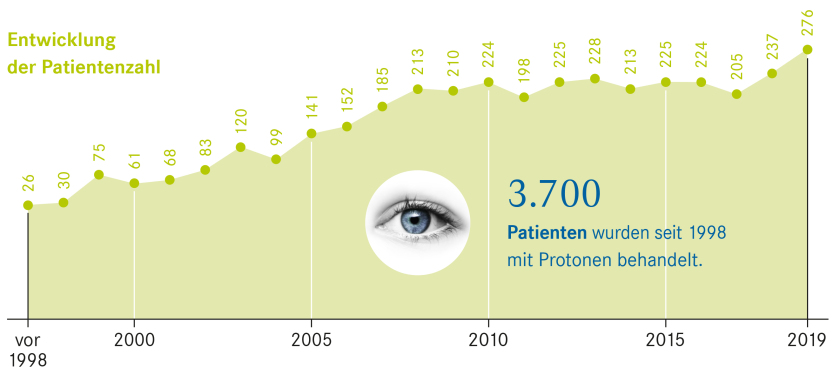20 percent more patients were treated with proton therapy in 2019

An individual eye shield is made for each patient to protect the surrounding tissue from the proton beam. © HZB

Number of patients who received the proton therapy offered jointly by Charité and HZB. © HZB/J. Politt
For more than 20 years, Charité - Universitätsmedizin Berlin and the Helmholtz-Zentrum Berlin (HZB) have jointly offered the irradiation of eye tumors with protons. In 2019, more patients were treated in Berlin-Wannsee than ever before. 276 patients - 20 percent more than in the previous year - underwent proton therapy. The treatment is specialized in choroidal melanomas of the eye. The proton accelerator at HZB is the only treatment facility for this disease in Germany.
500 to 600 people in Germany are affected by a malignant choroidal melanoma every year. In 97 percent of cases, the tumour can be completely destroyed by irradiation with protons. In most cases, not only the eye but also the vision can be maintained to a satisfactory degree. "The energy of the proton beam can be adjusted in such a way that practically only the tumor receives the radiation. Since the protons have a straight trajectory, the lateral scattering is much less than with X-rays," explains Dr. Jens Heufelder, the senior medical physicist at Charité - Universitätsmedizin Berlin. The protons effectively destroy the tumor, while the surrounding healthy tissue is largely spared.
To cope with the increase in patients in 2019, treatment operations at the proton accelerator have been extended to 12 hours. Approximately 45 percent of the patients came from the Berlin-Brandenburg region, the other patients came from other German states and other European countries (approximately 8 percent). The youngest patient who received proton therapy at HZB in 2019 was 8 years old, the oldest patient 96 years old. The average age was 61 years.
Since 1998, more than 3,700 patients have been treated with protons from the HZB accelerator. "The success of proton therapy is based on the collaboration between ophthalmologists, medical physicists and accelerator experts. As a result, the therapy has been continuously improved for the benefit of patients over the past few years", explains Prof. Dr. Andrea Denker, head of proton therapy at HZB.
(sz)
https://www.helmholtz-berlin.de/pubbin/news_seite?nid=21122;sprache=en
- Copy link
-
Optical innovations for solar modules - which are the most promising?
In 2023, photovoltaic systems generated more than 5% of the world’s electrical energy and the installed capacity doubles every two to three years. Optical technologies can further increase the efficiency of solar modules and open up new applications, such as coloured solar modules for facades. Now, 27 experts provide a comprehensive overview of the state of research and assess the most promising innovations. The report, which is also of interest to stakeholders in funding and science management, was coordinated by HZB scientists Prof. Christiane Becker and Dr. Klaus Jäger.
-
Catalysis research with the X-ray microscope at BESSY II
Contrary to what we learned at school, some catalysts do change during the reaction: for example, certain electrocatalysts can change their structure and composition during the reaction when an electric field is applied. The X-ray microscope TXM at BESSY II in Berlin is a unique tool for studying such changes in detail. The results help to develop innovative catalysts for a wide range of applications. One example was recently published in Nature Materials. It involved the synthesis of ammonia from waste nitrates.
-
BESSY II: Magnetic ‘microflowers’ enhance magnetic fields locally
A flower-shaped structure only a few micrometres in size made of a nickel-iron alloy can concentrate and locally enhance magnetic fields. The size of the effect can be controlled by varying the geometry and number of 'petals'. This magnetic metamaterial developed by Dr Anna Palau's group at the Institut de Ciencia de Materials de Barcelona (ICMAB) in collaboration with her partners of the CHIST-ERA MetaMagIC project, has now been studied at BESSY II in collaboration with Dr Sergio Valencia. Such a device can be used to increase the sensitivity of magnetic sensors, to reduce the energy required for creating local magnetic fields, but also, at the PEEM experimental station, to study samples under much higher magnetic fields than currently possible.
